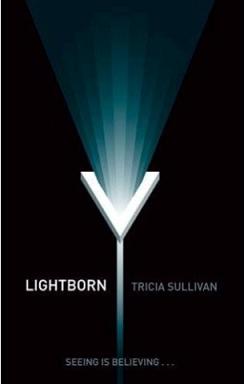
Lightborn
Tricia Sullivan
438 pages
published in 2010
Late last year Tricia Sullivan decried the fact that of the ten Clarke Award winners in the last decade, only one had been a woman, which in turned triggered a long discussion about women in sf in general much of it indexed at Torque Control. For me personally this discussion triggered a resolve to read more sf and fantasy written by women, as they had been woefully underrepresented until then. It was through the same discussions I learned about Tricia Sullivan herself, who as a writer had been completely unknown to me until then. Not only did she trigger the debate, her novel Maul ended second in the top ten Future Classics poll that Torque Control ran. So I kept an eye out for it at the local library, but they didn't have it.
What they had instead was Lightborn, her latest novel. It's a classic coming of age story, set in the city of Los Sombres in a somewhat alternate America, where instead of computers they have Feynmans and people use a special sort of light, Shine to program their own brains, as well as communicate with their version of the 'net, the field, which is also inhabitated by the lightborn of the title, artificial intelligences, both benign and rogue. There are safeguards build/created in the field to keep the lightborn tame and Shine under control, but of course these fail at the start of the novel --otherwise there'd be no story after all. It leaves almost all the adults in Los Sombres permanently Shined and useless and kids like Roksana and Xavier, our heroes, scrabbling to survive in the aftermath.
Lightborn opens with Roksana talking to a friend on the phone when she notices her parent's housekeeper acting weird, trying to drown herself in the swimming pool. That's her introduction to the consequences of the corrupt Shine, which she herself is immune to as she's incapable of being Shined; some rare mutation preventing her from responding to it. Something that before kept her from being normal now is a strength, as she strives to survive in a town gone mad as every adult and teenager over fourteen get caught by bad Shine. Desperate to escape, she has to double back to rescue a young girl from a Shine crazed mob.
The story than switches to Xavier, who did manage to escape Los Sombres with his Shine disabled mother, but is now stuck in limbo at a farm not far out of town, still within the evacuation zone. He and his mother have been living there for months, supported by the Native Americans also living in the area, in a colony of various Shine victims and burnouts, those who no longer have shine sensitivity because it had been removed from them. Xavier is getting towards the dangerous age where Shine sensitivity first manifests, but is surpressing this with Kiss, a drug that retards growth. Though scared by the various cases of Shine psychosis he lives with, he's also frustrated by having to stay a child and being treated as such. His routine is upset when a survivor from Los Sombres crashes on the highway leading past the farm and the scavenger horses trained by one of the Native Americans, Powaqa through Shine, stop going into Los Sombres to get more Kiss. So Xavier decides to go himself...
Obviously he and Roksana meet, though for the longest time they don't quite trust each other. Roksana has been thriving in post-collapse Los Sombres, one of the people trying to hold the Shinie dominated city together. Unlike the propaganda Xavier has watched, Los Sombres is not a cannibal invested hellhole, but has a functioning barter economy with various Shinies cooperating on the Red Line, which keeps the city together. Xavier's entry comes as the battle for the city, between the US Army and its myriad technological marvels and the seemingly very vulnerable shines, reaches a climax. Both Roksana and Xavier turn out to be instrumental in determining the fate of the city and its inhabitants.
What Tricia Sullivan has done with Lightborn is create a concretised metaphor for growing up, that long drawn out moment when you're a child on the edge of becoming an adult, looking out over the abyss to the incomprehensible horrors of adulthood. Both Roksana and Xavier are young teenagers, forced by circumstances to become more mature, but also kept from being fully adult. It's no coincidence that all adults in the novel are unreliable or downright dysfunctional, Shined or not Shined; they have to make their own decisions and every time they want to trust an adult, it turns out to be a mistake. Yet Sullivan doesn't glorify childhood: her heroes do have to grow up, make compromises, without being overtly dramatic about it. It's also no coincidence that Xavier and Roksana do not win a clean victory, if they even have won any victory but their personal ones at the end of the book.
The world of Lightborn I'm not sure makes sense on its own, with the field and Shine and all that not quite coming into focus, but then that's not the point of it. It is a book you need to read in large chunks, as I found my usual trick of reading it in small bites during my daily commute didn't get me in deep enough to get into the story. I had to get used to Tricia Sullivan's voice and it took more time than my commute allowed...
Webpage created 27-06-2011, last updated 28-06-2011.